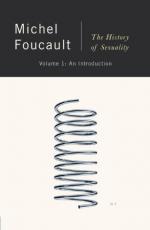
|
| Name: _________________________ | Period: ___________________ |
This test consists of 15 multiple choice questions and 5 short answer questions.
Multiple Choice Questions
1. What is the "discursive fact?"
(a) The way in which sex is put into discourse.
(b) The tendency of discourse to enlighten.
(c) The liberation attained through discussion.
(d) The need people experience to discuss illicit subjects.
2. What is Foucault NOT claiming to search for instances of?
(a) Instances of discursive production.
(b) Liberation from repression.
(c) Propagation of knowledge.
(d) Production of power.
3. What are the two great procedures for producing the truth about sex?
(a) The erotic arts and science of sexuality.
(b) Scientia sexualis and biology.
(c) Ars erotica and medicalization.
(d) Psychoanalysis and biology.
4. Why is the author of "My Secret Life" an interesting example in Foucault's argument?
(a) Because he represented the negative effects of repression.
(b) Because he was a window into the popular social norms of the time.
(c) Because he was turning sex into discourse for his own pleasure.
(d) Because he was part of the institutionalization of sexual discourse.
5. Which of the following is NOT true, according to Foucault, about children's sex in the eighteenth century?
(a) Precocious sexuality in children was no longer considered humorous.
(b) Discourse regarding it attempted to attain different results that it had previously.
(c) It was consigned to obscurity and universally stifled.
(d) A new regime of discourses regarding it came into existence.
6. The medical examination, the psychiatric investigation, the pedagogical report, and family controls can be said to be characterized by which of the following?
(a) Perpetual spirals of pleasure and power.
(b) The domination of authority figures and the repression of sexual practice.
(c) The effective practice of removing sexual impetus.
(d) Anxiety and domination.
7. What can be said about the family unit and educational institutes in the nineteenth century?
(a) They were a complicated network of power structures and mobile sexualities.
(b) Pleasure was derived solely by the trangression of rules.
(c) They repressed and extinguished sexuality in children.
(d) They had a polarization of pleasure and power.
8. What need was embedded in the incitement to discourse on sex in the beginning of the eighteenth century?
(a) Rebellion against the subjugating powers.
(b) To have the discourse not come from morality alone but from rationality as well.
(c) To spread the cleansing of the confessional to all areas of life.
(d) The expression of morally repressed desires.
9. What does Foucault say about the parallel sciences of the biology of reproduction and the medicine of sex in the nineteenth century?
(a) There was no exchange between the two.
(b) They operated in similar fashions.
(c) The information generated by one would cause advances in the other.
(d) Their theories were looked at with skepticism by the general public.
10. What modification happened to sexual discourse during the eighteenth and nineteenth centuries?
(a) It became increasingly vulgar as it was embraced by the lower classes.
(b) It was propagated as the only path to salvation.
(c) Focus shifted from the married couple to "unnatural" sexuality.
(d) It became increasingly specific in all spheres and dialogues.
11. What is scientia sexualis?
(a) The study of aberrations, perversions, and other forms of alternate sexualities.
(b) Procedures for telling the truth about sex which are adapted from confession.
(c) The biological science of reproduction.
(d) The science of mastering the act of sexual pleasure.
12. What happened to the penal and legal codes relating to sexual offenses in the nineteenth century?
(a) The codes were recognized by the church as a great moral necessity.
(b) The severity of the codes diminished greatly and often deferred to medicine.
(c) The effectiveness of the codes was considered the battleground against vice and evil.
(d) The codes transferred from a religious base requiring exorcism to a legal base requiring reform.
13. What is the relationship between pleasure and power?
(a) They seek out, overlap, and reinforce one another.
(b) They turn against each other.
(c) They are polarized.
(d) They cancel each other out.
14. Which of the following is NOT listed as one of the accepted ways to free oneself from the effects of sexual repression?
(a) Irruption of speech.
(b) Transgressing laws.
(c) Abstinence.
(d) Lifting of prohibitions.
15. What does Foucault say are joined in confession in the West?
(a) Sex and morality.
(b) Secrets and shame.
(c) Religion and sex.
(d) Truth and sex.
Short Answer Questions
1. What does Foucault say are the results of power exercised over sex?
2. What does Foucault mean by "we other Victorians?"
3. What does Foucault define as the popularly held belief about sexuality over the last two centuries?
4. Which of the following was NOT one of the three major explicit codes that governed sexual practices up to the end of the eighteenth century?
5. What does Foucault say has happened to sexual discourse?
|
This section contains 876 words (approx. 3 pages at 300 words per page) |

|




